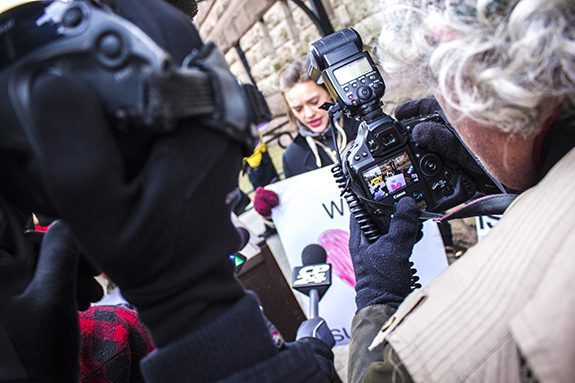If Jian Ghomeshi wasn’t already a household name, he certainly is now.
It was his third day on trial for sexual assault as the media awaited his arrival at the north entrance to Old City Hall.
On Feb. 4, journalists waited as a tight-lipped Ghomeshi dashed out of his black SUV with his defence lawyer, Marie Henein.
What came next was unannounced, and it temporarily redirected the coverage of the Ghomeshi trial.
When Jennifer-Leigh O’Neill and her two supporters turned the corner towards the north entrance, they didn’t know that they would be changing the conversation surrounding the trial that day.

Two demonstrators setting up just outside the north entrance of Old City Hall, where Jian Ghomeshi entered his third day of trial.
Their goal was just to show a small glimmer of solidarity for three of the 23 women who followed through with charges against the former host of CBC Radio’s Q.
Instead, O’Neill contributed to a national conversation about the traumatizing cross examinations, helping to shine the light on the process complainants go through in search for justice.
Before O’Neill showed up, the previous two days of trial were blasted across front pages, about the first complainant’s emails and car rides with Ghomeshi, and about whether or not she had hair extensions.
That morning TV cameras shifted their focus to O’Neill.
Henein’s line of questioning, which largely focused on the behaviour of the second complainant, Lucy DeCoutere, and her decision to continue her relationship with Ghomeshi after the alleged assault, all of a sudden found itself under the same microscope.
— Is this kind of defence commonplace in sexual assault trials?
— Is this a psychological battery of complainants?
O’Neill says the case casts a spotlight on “misogyny in the court system.”
“Even when you’re just in the courtroom, we don’t look at how much these complainants have to go through before the trial,” she said.
O’Neill, a sexual assault activist, says that when complainants initially come forward to the police, an official statement is required.
If charges are pressed, an investigation ensues and if or when it gets to trial, complainants are not allowed access to a copy of their original statement.
Defence lawyers, then, with access to the statement, can also be granted access to medical records, emails, psychotherapy receipts and more private information.
“The state feels like it’s relevant to have access to medical files, or your social media for the purpose of deciding whether you’ve been raped or not – or whether or not he punched you in the head – and whether or not that was acceptable,” O’Neill said.
She has trouble finding the legitimacy of this reasoning.
According to O’Neill, sexual assault trials should only rest on three pillars:
- Identity of those involved
- Did the acts indeed occur?
- Was there consent to these acts? (This includes age, sobriety and other states that could compromise appropriate consent.)
That’s it.
“Bikini photos, and sending love letter or flowers after the fact doesn’t un-punch a person,” O’Neill said of the recent revelations the defence undercovered in the cross-examination of Lucy DeCoutere.
As exploiting as it must feel for the complainants, O’Neill says, this amount of publicity can be beneficial to sexual assault victims and survivors in the long run.
“Public access to courtrooms is critical,” she said.
Before this trial, it was not widely known that sexual assault trials are publicly accessible. O’Neill said this high-profile case has changed that perception.

O’Neill demonstrating outside the north entrance of Old City Hall.
With widespread media coverage now focusing on the process of seeking justice, conversation can be directed at the court systems, the trends and the norms that allow or enable sexual assault within workplaces.
“All change happens incrementally, through a patchwork effect of different experiences. Ghomeshi, Cosby, Bikram, Woody Allen, Polanski – all of those cases start to weave a web,” O’Neill said.
The sign O’Neill holds reads, “Ghomeshi is not an isolated incident.”
But this sign really says to survivors on the sexual violence spectrum: We believe you. We stand beside you. Our support for you will never falter.

